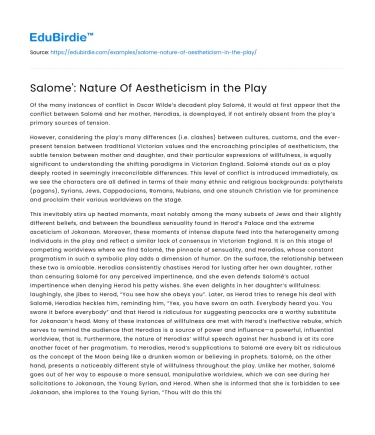Of the many instances of conflict in Oscar Wilde’s decadent play Salomé, it would at first appear that the conflict between Salomé and her mother, Herodias, is downplayed, if not entirely absent from the play’s primary sources of tension.
However, considering the play’s many differences (i.e. clashes) between cultures, customs, and the ever-present tension between traditional Victorian values and the encroaching principles of aestheticism, the subtle tension between mother and daughter, and their particular expressions of willfulness, is equally significant to understanding the shifting paradigms in Victorian England. Salomé stands out as a play deeply rooted in seemingly irreconcilable differences. This level of conflict is introduced immediately, as we see the characters are all defined in terms of their many ethnic and religious backgrounds: polytheists (pagans), Syrians, Jews, Cappadocians, Romans, Nubians, and one staunch Christian vie for prominence and proclaim their various worldviews on the stage.
Save your time!
We can take care of your essay
- Proper editing and formatting
- Free revision, title page, and bibliography
- Flexible prices and money-back guarantee
This inevitably stirs up heated moments, most notably among the many subsets of Jews and their slightly different beliefs, and between the boundless sensuality found in Herod’s Palace and the extreme asceticism of Jokanaan. Moreover, these moments of intense dispute feed into the heterogeneity among individuals in the play and reflect a similar lack of consensus in Victorian England. It is on this stage of competing worldviews where we find Salomé, the pinnacle of sensuality, and Herodias, whose constant pragmatism in such a symbolic play adds a dimension of humor. On the surface, the relationship between these two is amicable. Herodias consistently chastises Herod for lusting after her own daughter, rather than censuring Salomé for any perceived impertinence, and she even defends Salomé’s actual impertinence when denying Herod his petty wishes. She even delights in her daughter’s willfulness: laughingly, she jibes to Herod, “You see how she obeys you”. Later, as Herod tries to renege his deal with Salomé, Herodias heckles him, reminding him, “Yes, you have sworn an oath. Everybody heard you. You swore it before everybody” and that Herod is ridiculous for suggesting peacocks are a worthy substitute for Jokanaan’s head. Many of these instances of willfulness are met with Herod’s ineffective rebuke, which serves to remind the audience that Herodias is a source of power and influence—a powerful, influential worldview, that is. Furthermore, the nature of Herodias’ willful speech against her husband is at its core another facet of her pragmatism. To Herodias, Herod’s supplications to Salomé are every bit as ridiculous as the concept of the Moon being like a drunken woman or believing in prophets. Salomé, on the other hand, presents a noticeably different style of willfulness throughout the play. Unlike her mother, Salomé goes out of her way to espouse a more sensual, manipulative worldview, which we can see during her solicitations to Jokanaan, the Young Syrian, and Herod. When she is informed that she is forbidden to see Jokanaan, she implores to the Young Syrian, “Thou wilt do this thing for me” and that she will gaze upon him if he does, until he eventually succumbs to her seduction and relents. Once she is granted access to Jokanaan, she wastes no time in characterizing his body as an ever-morphing thing of grotesque beauty. His body is at once “white like the lilies of a field that the mower hath never mowed” and “like a plastered wall where vipers have crawled” (208); regardless of whether he is a forbidden delight or a loathsome creature, he is subject to her sensual characterization of his body. As with the Young Syrian, Salomé is likewise manipulative in her interactions with Herod, using his obsession with her beauty to ensure the execution of Jokanaan, who rejected her. Unlike Herodias, whose influence is based on a more or less objective worldview, Salomé embraces her sensual nature in order to manipulate the desires of others for her own benefit. On the surface it would appear that mother and daughter have formed a unique coalition against the improper advances of Herod. It is only on closer inspection that these two present two distinct types of worldviews, which lends them distinctive styles of rebellion and willfulness.
Salomé creates the realities of those around her, specifically that of Jokanaan’s body, and allows this reality to be shaped by mercurial whims; Herodias accepts her version of reality based on superficial observation and enforces it with pragmatic correction. Furthermore, through their willfulness, both can be seen as representing the major conflict (and, perhaps, reconciliation) between traditional Victorian values and Wilde’s version of aestheticism. One subtle but telling example is that Salomé never addresses Herodias, despite Herodias’ many attempts to address Salomé. Mother and daughter simply do not exchange conversation during the play. The fact that they merely talk around each other suggests that there may be no reconciliation between their two worldviews—that utilitarian Victorian values of pragmatism and an unrelenting view of reality cannot usefully complement an aesthetic worldview, in which the subjective piquing of the senses overrules (or defies) a consensus of Truth. On the other hand, the shared goal of subverting Herod’s authority suggests that, while the opposed worldviews may not usually be complementary, they may coexist and share similar agendas. At the very least, they may not always be diametrically opposed.
As Salomé illustrates, the nature of aestheticism is to be subjective, to enjoy and produce social change, and to unabashedly stimulate the senses. Traditional Victorian values, as espoused by Herodias, may generally appear to be a constant competitor in the arena of worldviews, but as the willful intentions and subtle conflict between Salomé and Herodias suggest, it may be more the case that Wilde perceives these as complementary rather than competitive.






 Stuck on your essay?
Stuck on your essay?

